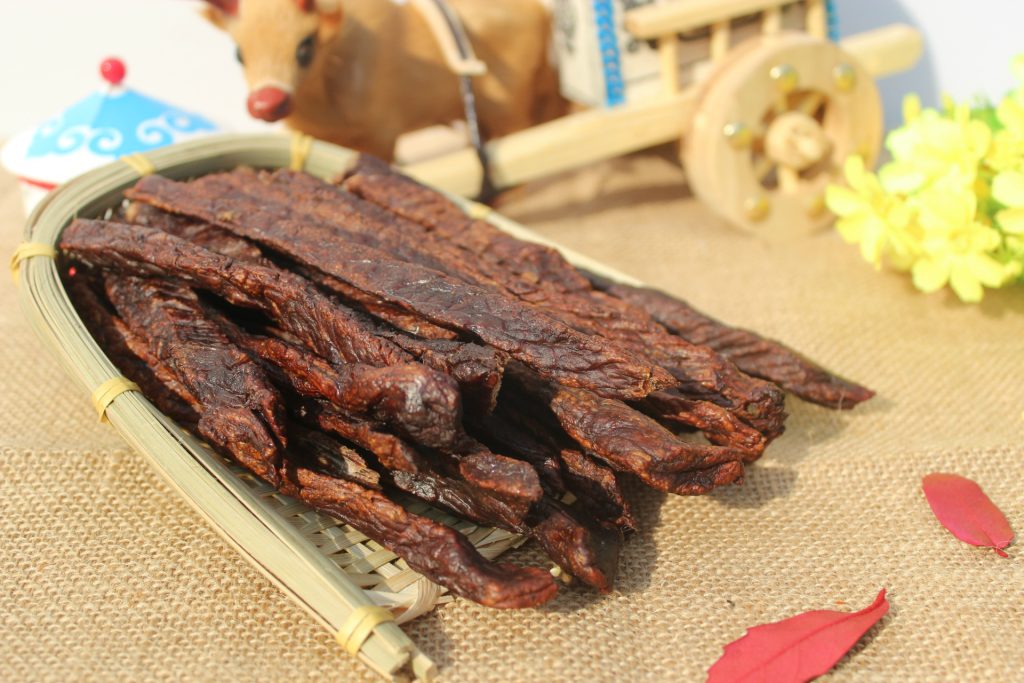Can Dogs Eat Beef Jerky? Everything You Need to Know
Beef jerky is a popular snack among humans, but what about dogs? Many pet owners wonder if beef jerky is safe for their furry companions. While beef itself is a good source of protein, not all types of beef jerky are suitable for dogs. In this article, we’ll explore whether dogs can eat beef jerky, the potential risks, and the best alternatives for your pup.
Is Beef Jerky Safe for Dogs?
The short answer is it depends. While plain, unseasoned beef jerky may not be harmful to dogs, many store-bought varieties contain harmful ingredients like:
-
High Sodium Levels: Most commercial beef jerky products are loaded with salt, which can lead to dehydration, high blood pressure, and kidney problems in dogs.
-
Garlic and Onion Powder: These common seasonings are toxic to dogs and can cause anemia and digestive issues.
-
Artificial Preservatives: Chemicals like BHA, BHT, and nitrates may be harmful to your dog’s health.
-
Sugar and Artificial Sweeteners: Some brands contain sugar, and others may use xylitol, which is highly toxic to dogs.
Potential Risks of Feeding Beef Jerky to Dogs
If your dog consumes beef jerky that contains harmful ingredients, they may experience negative health effects, including:
-
Dehydration – Excessive salt can lead to increased thirst, urination, and dehydration.
-
Digestive Upset – Spices and preservatives may cause vomiting, diarrhea, or stomach pain.
-
Kidney Damage – High sodium levels can stress a dog’s kidneys, potentially leading to long-term issues.
-
Toxic Reactions – Garlic, onion, and xylitol poisoning can be life-threatening if consumed in large quantities.
-
Obesity & Diabetes – If the jerky contains added sugar, it could contribute to weight gain and metabolic disorders.
If your dog accidentally eats seasoned or store-bought beef jerky, watch for symptoms like vomiting, diarrhea, excessive thirst, or lethargy, and contact your veterinarian if symptoms persist.
Healthier Alternatives to Store-Bought Beef Jerky
If you want to treat your dog to beef jerky, it’s best to make a safe, dog-friendly version at home. Here’s how:
Homemade Dog-Safe Beef Jerky Recipe
Ingredients:
-
Lean beef (flank steak, sirloin, or top round)
-
No salt, seasonings, or additives
Instructions:
-
Preheat your oven to 170°F (75°C).
-
Slice the beef into thin strips.
-
Lay the strips on a baking sheet lined with parchment paper.
-
Bake for 4-6 hours, flipping halfway through, until fully dried.
-
Let it cool completely before serving.
This all-natural beef jerky is a safer and healthier alternative for your dog. You can store it in an airtight container for up to two weeks.
How Much Beef Jerky Can a Dog Eat?
Even if you prepare dog-safe beef jerky, moderation is key. Treats should make up no more than 10% of your dog’s daily caloric intake.
Here’s a general guideline:
-
Small dogs (under 20 lbs) – ½ to 1 small strip per day
-
Medium dogs (20-50 lbs) – 1 to 2 small strips per day
-
Large dogs (50+ lbs) – 2 to 3 small strips per day
Always introduce new treats gradually to ensure they don’t upset your dog’s stomach.

What to Do If Your Dog Eats Store-Bought Beef Jerky?
If your dog sneaks a piece of store-bought beef jerky, don’t panic—a small amount is unlikely to cause serious harm. However, if they consume a large quantity or a variety that contains toxic ingredients, follow these steps:
-
Check the ingredients – Look for anything harmful like garlic, onion, or xylitol.
-
Monitor for symptoms – Watch for vomiting, diarrhea, excessive thirst, or lethargy.
-
Provide fresh water – Help flush out excess sodium and toxins.
-
Contact your vet – If your dog shows signs of poisoning or distress, seek immediate veterinary care.
Final Thoughts: Can Dogs Eat Beef Jerky?
Dogs can eat beef jerky, but only if it is plain, unseasoned, and free from harmful additives. The safest option is homemade beef jerky made specifically for dogs. Store-bought varieties often contain high sodium levels, spices, preservatives, and artificial sweeteners, which can be harmful or even toxic.
For the best results, always choose natural, high-quality treats and consult your vet before introducing new foods into your dog’s diet.
Would you like to learn more about dog-friendly snacks? Drop your questions in the comments below!







